XCOM: Chimera Squad Analysis Index
XCOM: Chimera Squad is of course an experimental sidegame that nonetheless acts as something of a sequel to XCOM 2, narratively. I kind of suspect most of its experimental ideas aren't going to make it into future games, and honestly, there's a good chunk I wouldn't want to come back, but I do appreciate points like that it continues the trend in XCOM 2 and War of the Chosen of trying to embrace replayability as an actual goal. It... doesn't succeed anywhere near as well as War of the Chosen, unfortunately, but I'd say it hits the mark better than base XCOM 2, which is impressive given how radically it changes the basic framework of gameplay. Among other points, this makes me hopeful that XCOM 3 will both shoot for similar replayability and then manage to hit in the right vicinity on initial release rather than requiring DLC seriously overhaul it to hit that note.
Note that to a certain extent these posts assume you've read my prior series on Enemy Unknown/Within and XCOM 2.
As an aside, this series exists in no small part because it's abundantly clear most people simply didn't experience the game in the manner the devs were expecting. The game's design is anchored heavily in the idea that a player will play the game a minimum of three times, but going by Steam's global Achievement stats, as of November 2023 less than 30% of players complete one full run, and only 1% of players have seen every variation on all the Investigations. The game comes across very differently if seen across multiple runs, a fact that's probably not apparent at all to most players. So this series is in part to elucidate something like the 'complete picture' of Chimera Squad that almost nobody actually sees at all.
-----------------------------
The intro. In which I talk about how Chimera Squad is an interesting experiment and a pleasant surprise on many levels, albeit unfortunately having much lower replayability than War of Chosen manages.
The Timeline. Chimera Squad's turn mechanics, which are one of its more obvious and more obviously interesting experiments. There's clunkiness there, but less than I'd have expected for such a significant overhaul.
Verge. Your Sectoid agent, his gameplay is rough around the edges but overall reasonably fun. I also explain Training, Scars, and the Breach Phase, including some unintuitive and non-obvious wrinkles. (Why would a player assume that Breach Phase shots don't spend ammo?)
Godmother. Your perfectly ordinary human agent who keeps up with the more superhuman agents around her through hard work and thorough professionalism, a scenario the game sells surprisingly well. I also touch on altered movement mechanics and how far the Firaxis XCOM games have come on depicting an adequately diverse world, among other things the series has improved on.
Cherub. Our first hybrid agent, our first Pistol-user, and our most cheery agent; it's funny to me how he has a Serious or Angry look in his default portrait. I also touch on how Chimera Squad reworks the context on hybrids to make a bit more sense than in XCOM 2.
Terminal. The final agent forced into your first run's initial squad, Terminal reprises the medical portion of XCOM 2's Specialists. I quite appreciate what was done with her personality, though her gameplay is a bit rough around the edges.
Axiom. The Muton on the team, Axiom's gameplay is very rough in design terms but surprisingly he's a very solid agent as far as winning the game goes. As a character he's more consistently well-done, and I quite like him... though I also talk about Chimera Squad's attempt to revamps Muton visuals to be 'friendlier', and how horribly wrong it ends up being.
Claymore. Wields a Shotgun, uses explosives, isn't a talking meme. (Unlike most video game explosives experts) Claymore is pretty cool by me, though his gameplay could've been a bit better.
Torque. Your Viper agent, while she's got clunky elements I'd like to see smoothed out, she's overall one of the more solidly-designed agents in final details. She's also my personal favorite character in the game, for a number of reasons, and a pleasant surprise in terms of Chimera Squad managing philosophical coherency on topics I rarely see pop culture be coherent on.
Blueblood. Probably the most powerful agent in Chimera Squad, in spite of some of his specific elements being lackluster. Also the only agent I can't really think of anything to say about when it comes to characterization.
Zephyr. Chimera Squad's most mis-designed agent, and I'm not sure why. I like her writing, but yikes that gameplay.
Shelter. The agent with the second-weakest gameplay and the weakest writing. Ouch.
Patchwork. Your other Gremlin user, representing the Specialist's offensiv lane of skills... plus having Stasis, rather unexpectedly.
Androids. The latest stab at SHIVs/Mecs/SPARKs, but also replacing squad expansion upgrades with backup agents who come in when main squad members go down. The final result works pretty poorly, unfortunately, but the experiments happening here are interesting, and may be laying the groundwork for a more successful implementation of similar ideas in XCOM 3.
Weapons. The core of damage definition and progression. Several curious decisions in here, but the only one I'd call harmful is 'Pangolin Gauntlets can't be upgraded'.
Epic Weapons. A newfangled concept for the XCOM series, Epic Weapons are your Diablo Uniques or the like. Surprisingly enough, Epic Weapons sidestep a lot of problems common to this type of concept, though the execution is still clunky. I actually hope XCOM 3 expands on the concept, honestly.
Weapon Attachments. Returning from XCOM 2 and showing signs XCOM 3 might finally smooth out this system's rough edges... though with new wonkiness added by Chimera Squad. Hopefully XCOM 3 will avoid the wonkiness.
Ammo. Ammo returns, steps are made to make it less central, and... it remains pretty central, unfortunately. I still don't get why Chimera Squad didn't give Ammo its own Item slot.
Grenades. Grenades return, and... are largely less relevant? Some new experiments with grenade ideas happen, too, with mixed results.
Underarmors. The return of XCOM 2 Vests, with more variety and a dedicated slot of their own, but hampered by being overall even weaker and more niche than XCOM 2 Vests.
Breach Items. A whole new Item type to go with a new mechanic, with a lot of clunkiness resulting. It's too bad these seem unlikely to get a second chance in a later game.
Miscellaneous Items. The Items that aren't in any competes-with-itself sub-category. There's surprisingly few of them when you consider prior games!
Field Teams. In which I cover Geoscape general mechanics (Particularly Unrest), Field Team mechanics, and the Geoscape abilities closely tied to Field Teams. All mechanics that are neat ideas but a bit rough in implementation; it'd be nice if a later game came back to this framework and refined it.
Spec Ops. Chimera Squad's version of Covert Ops, Spec Ops overall don't work as well as Covert Ops. They're not terrible, but honestly if Spec Ops were cut entirely the loss would be barely felt. It's a bit weird.
Initial Settings. An overview of the impacts of the settings you choose when starting a new run, including of course difficulty.
The Progeny intro. A brief overview of Progeny trends or factional character. They're... oddly-handled all-around, for reasons unclear.
Progeny Acolyte. One of the Progeny's two most basic units. Plus I lay out my formatting, talk a bit about Alert actions, and discuss Chimera Squad's potentially-useful ambiguity.
Progeny Thrall. The other most basic Progeny unit, their brainwashed slave-soldiers hijacked from the previous regime's brainwashed slave-soldiers. Also our first example of the (disapponting-in-implementation) mechanic of individual enemies being able to have variable weapon loadouts, and unfortunately a bearer of the game's most horribly-communicated enemy ability. There's a surprisingly large amount to say given that Thralls spend a lot of time being a boring stat block in practice.
Progeny Brute. One of the Progeny's 'semi-elite' units, with solid enough gameplay design... but a giant question mark as far as their narrative. Who are these Mutons? Why are they working with the Progeny? Are they mind-controlled, or do they have some reason to agree with the Progeny agenda and all? No idea!
Progeny Resonant. Another 'semi-elite' Progeny unit, with much clearer and more interesting narrative elements than Brutes but some of the worse gameplay design of Chimera Squad. It's at least mostly not intrusive in its flaws, so it could be worse, but... unfortunate nonetheless.
Progeny Sorcerer. An enemy interesting to me more for how it deviates from janky industry 'rules' than anything else. Also a bit of discussion of how the Progeny's retrofuturepunk aesthetic works surprisingly well in context.
Progeny Codex. A familiar face from XCOM 2, but drastically less of a pain due to various context changes plus some more direct tweaks or nerfs. It's too bad their narrative end just keeps getting muddier. I also briefly discuss a potential XCOM 3 class idea where I would be extremely surprised if it actually happens. (But would be quite cool if it worked out)
Progeny Archon. Unfortunate gameplay design, and an unclear narrative context, I'm half-expecting future materials to ignore or heavily retcon Archons as they appear in Chimera Squad.

Progeny Leader: Violet. An overview of Progeny narrative stuff, a summary of how Take Down (Investigation target) missions work in general, and talking pretty specifically about the Take Down the Progeny mission works. There's also some relatively obvious signs that Chimera Squad wasn't quite finished when it shipped.
Gray Phoenix intro. Probably the most straightforwardly coherent and comprehensible faction. I also touch on faction musical identity being a thing.
Gray Phoenix Legionnaire. The basic Muton unit of Gray Phoenix, and surprisingly bland in practice.
Gray Phoenix Adder. The basic Viper of Gray Phoenix, and interesting on a number of levels. Their gameplay could be better, but still; interesting.
Gray Phoenix Python. An enemy I have a hard time coming up with interesting things to say about, though a functional enough enemy.
Gray Phoenix Faceless. Without their pretending-to-be-somebody-you-rescue mechanic, Faceless are kind of whatever, especially in a game with verticality barely mattering. I do appreciate them showing up, but... their gameplay underwhelms, alas.
Gray Phoenix Paladin. I really, really love these guys. Perfect aesthetic, some of the better gameplay opportunities of the game, and no significant flaws to add qualifiers to all that. Excellent.
Gray Phoenix Dominator. Dominators also work surprisingly well! Not as fantastically as Paladins, but still quite nice. I also touch on one of the more notable design successes of Chimera Squad, where significant system mastery doesn't end up 'flattening' the game experience, which is an issue a lot of games struggle with. (Including XCOM 2!)
Gray Phoenix Berserker. I also cover Outbreak missions here, because Berserkers have the unique quality that they can show up in Outbreak missions regardless of Investigation. I really wish the game actually addressed this; why are there Berserkers running about when a District is collapsing into total chaos, with no regard to your current Investigation target? It's conspicuously odd, and entirely unaddressed.
Gray Phoenix Praetorian. I love these guys!... even with how much weird jank is attached to them.
Gray Phoenix Sectopod. How did they get one of these?
Gray Phoenix Crew Chief Yarvo. (And Technician Xel) There's wonkiness to Gray Phoenix's writing I wish had been handled differently, but of overall lesser importance than some of the things done extremely well. So I'm pretty positive on their narrative end, overall! I do unfortunately think they have probably the least compelling Take Down set in terms of gameplay, though.
Sacred Coil Intro. The overall most consistently difficult faction, mostly due to various bits of jank. Even so, they're in a lot of ways my favorite faction; among other things, I like their music the most. I just wish their gameplay wasn't plagued with so much jank.
Sacred Coil Android. The return of Derelict Mecs from the Shen's Last Gift mission in XCOM 2, and I'm so glad that concept got a second chance. Also our second enemy with a variable weapon carried, which... doesn't really do anything of interest. Also unfortunate is that Chimera Squad's design isn't really meant to accommodate a faction having a unit that can't be KOed and eats lots of 'slots' in enemy unit generation.
Sacred Coil Commando. The organic basic enemy of Sacred Coil, with not-ideal gameplay, unclear narrative, and an aesthetic that is very confusing. They're usually just a bit boring in actual play, which isn't too bad, but still.
Sacred Coil Purifier. A War of the Chosen enemy given a new lease on life, Chimera Squad's version suffers from various AI problems and is also our first clear example of a design oddity with Sacred Coil forces; a LOT of their units are frontloaded in their effectiveness, where hitting Sacred Coil first is much more dangerous than hitting them second or third. I'm also a little frustrated that we don't know if the name points to them being the same people as War of the Chosen Purifiers, or if it's just supposed to be a recycled name with no deeper meaning than 'we like using Purifier as the name of flamethrower infantry'.
Sacred Coil Turret. Another returning XCOM 2 unit with a significant facelift, Turrets in Chimera Squad can be interesting enemies in smaller maps but tend to be pretty irrelevant on larger maps. That they use the regular enemy spawn routine is also regularly awkward.
Sacred Coil Guardian. It's the return of ADVENT Shieldbearers!... only Guardians are a lot more menacing in practice. The change in turn mechanics and introduction of the Breach Phase is really favorable to them! Damage numbers being overall down also helps them, since Energy Shield's numbers haven't been re-tuned.
Sacred Coil Mec. For some reason a lot of unique oddities are concentrated on the Mec. Still, they're overall a much less frustrating enemy than in XCOM 2.
Sacred Coil Neonate Chryssalid. I really do appreciate Neonate Chryssalids getting a chance to be seen by players who never bothered to play It Came From The Sea. Too bad the mechanical implementation in Chimera Squad itself is pretty redundant with the mature Chryssalids that are also in the game.

Sacred Coil Mature Chryssalid. As the two Chryssalid types are implemented so similarly in Chimera Squad, this post mostly touches on the collective narrative stuff of Chryssalids; if you want gameplay discussion, it's back in the Neonate post.
Sacred Coil Ronin. One of the rudest enemy designs in the game for a learning player, and still pretty dangerous even if you know their full kit. Their narrative/aesthetic bits are potentially pretty cool, though.
Sacred Coil Andromedon. Much easier to kill if you lack anti-Armor tools than in XCOM 2, but with their Shell stage far more likely to seriously matter. I like the overall result!
Sacred Coil Gatekeeper. Surprise! Sacred Coil gets the ultimate regular enemy of XCOM 2 as one of their boss enemies! It's admittedly not so bad if you know it's coming and know the game's mechanics decently well, but yikes. Anyway, I also cover the variations on Take Down Sacred Coil, as well as potentially-intriguing setting details being maybe-implied.
Sacred Coil Bellus Mar. One of the rudest enemies in the game for a first-time player, and also little-explained as a narrative entity, but arguably the easiest faction leader for an experienced player and with narrative elements I very much do appreciate; my feelings on him are pretty mixed.
Shrike Intro. It's those guys you encounter first, but which I'm covering last! It'll make sense later.
Shrike Trooper. Shrike's basic unit, with the unique distinction of being the only unit in the game to technically have 4 tiers of stats. Also one of the game's only units to genuinely not have a special ability.
Shrike Hitman. The most reliably dangerous of the common Shrike troops, especially for a learning player who isn't familiar with what they can do. Which is unfortunate, as their aesthetics point in the direction of them being less of a threat than Troopers, when they're actually much more dangerous.
Shrike Bruiser. A unit with multiple non-obvious oddities, who in practice is usually a straightforward unit who just shoots people and has decent durability.
Shrike Necromancer. A summoner-focused Sectoid that is usually pretty ignorable, because you let them summon as their first turn and then negate their actions before their summons do anything by virtue taking out the Necromancer, which automatically kills their summons.
Shrike Cobra. A striking, cool design, a reasonably threatening enemy, and a cool ability that unfortunately would've worked better in XCOM 2 than in Chimera Squad itself.
Shrike Bomber. A passive that would've been more reliably meaningful in XCOM 2, and a dangerous ability they use in a sufficiently incoherent way they can be more dangerous to their own team than to your agents, but can sometimes deliver unavoidable damage, Bombers could've used more AI polish.
Shrike's Endgame. In which I discuss serious spoilers and raise theories about interesting things that might be meant to be going on with Shrike.
Misc. Stuff I wanted to cover in more detail, but at least as of this time it's not realistic for me to do so.
Credits Images. I always love when credits are fun like this, but Chimera Squad's credits stand out for how they stay consistent with its larger messages in unexpected ways. This post also acts as a denouement for me talking about Chimera Squad in general.
And that's everything!








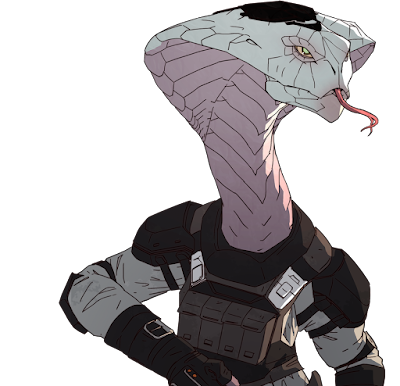



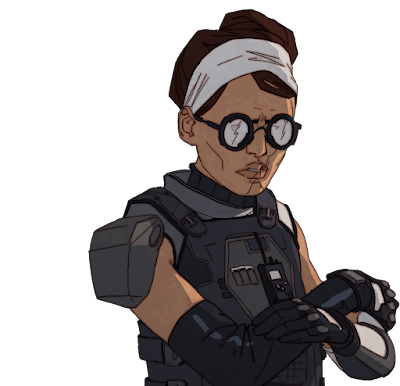

















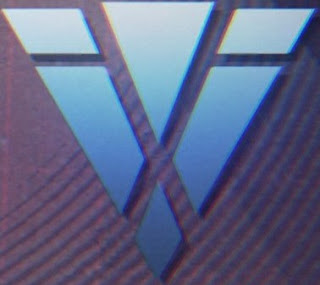

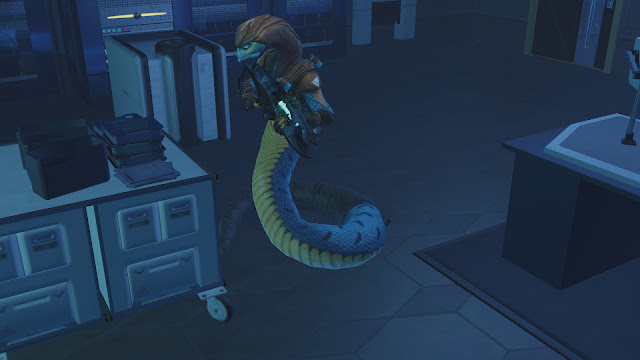

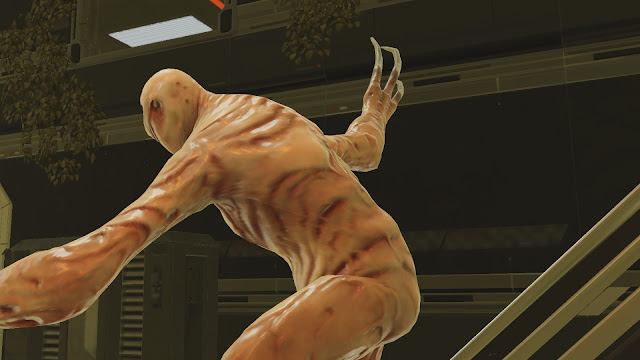


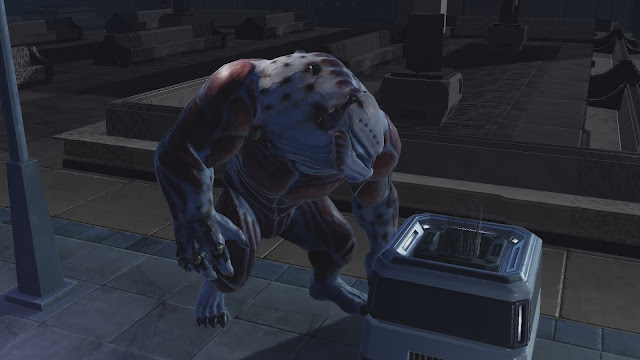




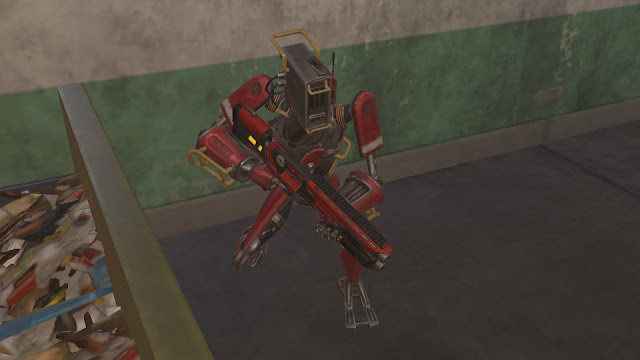
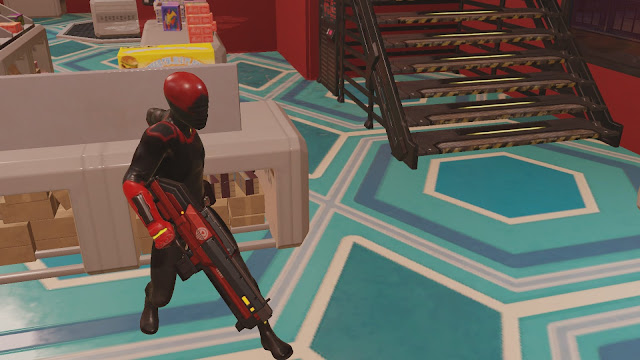






















Comments
Post a Comment